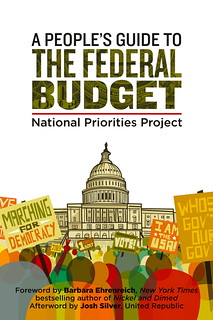Knowledge Is Power (And You Don’t Have to Take My Word for It)
By
Mattea Kramer
Posted:
|
Budget Process
This week we announced the release of our new book A People’s Guide to the Federal Budget, and in yesterday’s blog post we admitted to being idealists: A book can change the world, we said. But it’s not just because we’re idealists that we think so. Consider the evidence.

Regular Americans can tackle federal budget deficits – when armed with information. A study by the Program for Public Consultation gave randomly-selected Americans solid budget information and asked them to consider trade-offs faced by lawmakers in Washington. Respondents made choices and cut deficits, most often by reducing military spending and raising taxes for the wealthiest Americans.
An initiative called America Speaks brought together Americans of all backgrounds and political beliefs. Participants received information about the federal budget, and then Tea Partiers worked alongside members of the liberal organization MoveOn to come up with solutions to reduce deficits while preserving shared priorities like Social Security. No conflicts erupted, and afterward participants said they felt empowered and informed.
And here’s the icing on the cake. A couple months ago the New York Times Book Review enumerated how books of the twentieth century changed Washington as they swayed debates and influenced policymakers. “A book, by its mere existence, can lend legitimacy to an argument in Washington’s sound-bite-driven debate,” wrote Emily Parker in her essay.
A People’s Guide to the Federal Budget is coming to a bookstore near you. What’s the big idea inside this book? That regular people like you and me, with information and civic action, can sway the priorities in Washington.